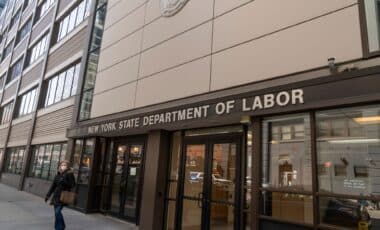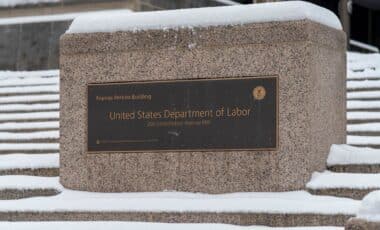New data reveals that wage growth fell slightly short of expectations, pointing to a growing impact of the Bank of England’s interest rate increase on the broader economy.
UK Wage Growth Falls Below Expectations
According to figures from the Office for National Statistics (ONS), annual wage growth, including bonuses, registered an average of 5.6% in the period between November and January, falling slightly below economists’ expectations of a more stable 5.8%.
Excluding bonuses, annual pay growth rose by 6.1% in the three months to January, ONS said.
Although wages are currently growing at a slower pace than before, lower inflation rates mean households are still perceiving an increase in their real pay. Real total pay grew by 1.4% between November and January.
ONS director of economic statistics Liz McKeown remarked: “Recent trends in the jobs market are continuing with earnings, in cash terms, growing more slowly than recently, but, thanks to lower inflation, real-term pay continues to increase.”
UK Labour Market Struggles as Unemployment Rises and Job Openings Decline
Other indications showed that the labour market, which was once considerably resistant to the BoE’s rate increases, is currently facing the risk of loosening.
Unemployment surged to 3.9% from 3.8%, surpassing market expectations. The number of job openings, an indicator of labour demand, decreased by 43,000.
This translates to a continuous decline in job opportunities for 20 consecutive quarters. However, it’s worth mentioning that there are still approximately 100,000 more vacancies than at pre-pandemic levels.
Jack Kennedy, a senior economist at Indeed, remarked on today’s ONS figures, describing a familiar trend of a slow softening in the labour market and a reduction in pay pressures. He emphasized that this is an incremental process. The numbers come in at a time when the Bank of England is considering when to initiate a decrease in interest rates, currently standing at a post-financial crisis high of 5.25%.
Bank of England Monitors Labour Market Amidst Wage Growth Slowdown
Rate-setters are closely monitoring the labour market to measure the impact of higher interest rates on slowing down the economy and curbing inflation.
The recent Monetary Policy Report that the bank issued emphasized the need for a “moderation in pay pressures” to address service inflation.
Despite Thursday’s data showing a slowdown in wage growth, economists believe it won’t prompt an important policy shift from the Bank.
Yael Selfin, Chief Economist at KPMG UK, highlighted that the strong pay growth makes it unlikely for major policy change. Paul Dales, Chief UK economist at Capital Economics, matched this sentiment, adding that the easing in wage growth might still be too slow for the Bank’s preference.
While the labour market shows weakening signs, the KPMF-REC jobs survey revealed a decrease in starting salary inflation to its lowest rate in nearly three years, coupled with reduced demand for workers and a rise in candidate supply.









